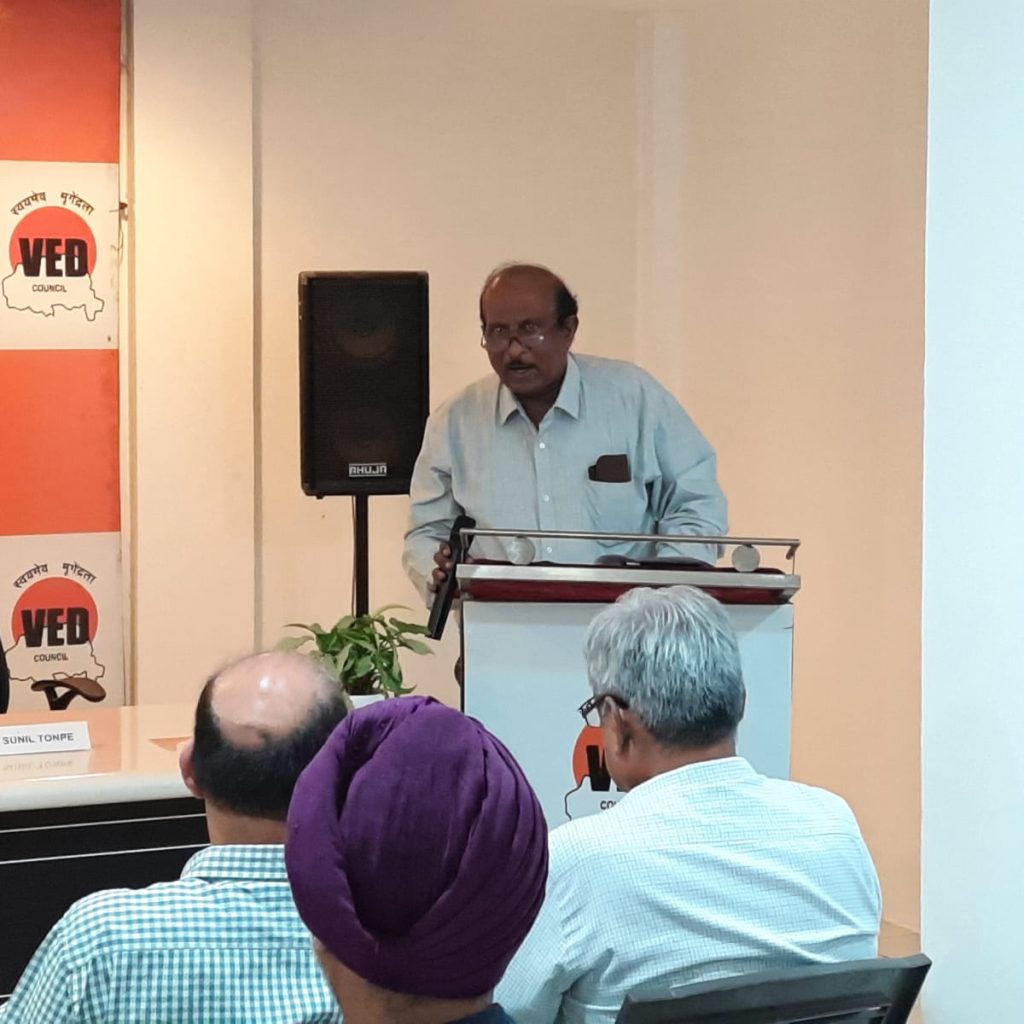VED Council monthly meeting “Progress Pulse” organised a very interesting talk by Dr Sunil Tonpe, Ex-Senior Scientist, BARC – Hyderabad on “Advantage Vidarbha Strategy for development of Vidarbha Industrial & Modern Infrastructure of Vidarbha” at the Smt. Rupadevi Daga Hall | VED Council on Fri., 23rd Aug 2024.

He was honored by various prestigious award like, Young Scientist Award by Indian Nuclear Society, Gold medal was received from President of India. Dr APJ Abdul Kalam in year 2003 and DAE, Scientific and Technical Excellence Award in year 2006 , Gold medal was received from Ex. President of India Dr APJ Abdul Kalam. He was also honoured number of time by Department for Atomic Energy (DAE) for his innovative research, development and production.
Dr. Tonpe’s presentation emphasizes a comprehensive development strategy for Vidarbha, focusing on Vidarbha’s infrastructure and development challenges. This section provides an overview of the current situation and requirements in key areas including water, power, transport, and recurring droughts, as well as the advantages of Nagpur, etc.
Dr. Tonpe’s spoke on underscores the urgent need for targeted actions in infrastructure development, particularly in water, power, and transport sectors, to address the recurring challenges faced by Vidarbha. By focusing on these areas and leveraging regional advantages, Vidarbha can set a course for sustainable development and economic growth.
Infrastructure Requirements.
Water
• Current Situation: Vidarbha experiences frequent droughts, leading to unreliable water supply for agricultural and industrial needs.
• Requirements: Development of advanced water management systems, such as efficient irrigation technologies and rainwater harvesting. Investment in large-scale water projects like dams and reservoirs is essential.
Power
• Current Situation: Power supply in Vidarbha is inconsistent, affecting both industrial and residential needs.
• Requirements: Expansion of power generation infrastructure, including renewable energy sources like solar and wind. Improvement of grid reliability and distribution efficiency is crucial.
Transport
• Current Situation: Transport infrastructure in Vidarbha is underdeveloped, limiting economic activities.
• Requirements: Development of road, rail, and air connectivity to enhance logistical efficiency. Focus on modernizing existing infrastructure and constructing new transport links.
Human Resource Ability
Urbanization
• Current Situation: Urban areas in Vidarbha are growing, but urban infrastructure and services lag behind.
• Requirements: Planning and investment in urban infrastructure, including housing, sanitation, and public services. Strategies to manage urbanization effectively and ensure sustainable growth.
Private Capital Investment
• Current Situation: Investment levels in Vidarbha are relatively low compared to other regions.
• Requirements: Creation of a favorable investment climate through policy reforms, incentives, and support for private enterprises. Development of industrial parks and special economic zones.
Political Dominance
• Current Situation: Political influence can impact regional development priorities and implementation.
• Requirements: Ensuring political stability and alignment with development goals. Encouraging transparent and effective governance practices to facilitate progress.
Concerns for Vidarbha
Recurring Droughts
• Impact: Frequent droughts exacerbate water shortages and agricultural distress.
• Action: Invest in drought-resistant crops, efficient irrigation, and water conservation measures.
Farmers’ Distress
• Impact: Financial stress and declining agricultural productivity affect farmers’ livelihoods.
• Action: Provide financial support, crop insurance, and training for sustainable farming practices.
Relatively Low GDP
• Impact: Vidarbha’s economic performance lags behind other regions.
• Action: Diversify the economy by promoting industrialization and enhancing productivity in key sectors.
Advantage Nagpur
Agro-Climatic Characteristics
• Current Situation: Vidarbha’s climate is suitable for certain crops and agricultural activities.
• Advantage: Leverage favorable agro-climatic conditions to enhance agricultural productivity and develop agro-based industries.
Irrigation Development
• Current Situation: Ongoing efforts to improve irrigation infrastructure.
• Advantage: Expansion of irrigation networks can mitigate the impact of droughts and boost agricultural output.
Regional Growth Strategy
The Role and Challenges of New Agriculture
• Strategy: Promote innovative agricultural practices, such as precision farming and agro-technology.
• Challenges: Overcome barriers related to technology adoption and infrastructure.
Spreading the Industrialization
• Strategy: Encourage industrial growth in various sectors, including manufacturing and services.
• Challenges: Address infrastructure gaps and attract investment through incentives and policy support.
Development of Water Resources
• Strategy: Enhance water resource management through large-scale projects and conservation efforts.
• Challenges: Secure funding and manage the environmental impact of water projects.
Widening the Connectivity
• Strategy: Improve transport and communication infrastructure to facilitate economic activities.
• Challenges: Address funding constraints and coordinate infrastructure development across regions.
Our Vision to transform Vidarbha into a leading region for industrial and agricultural excellence, ensuring sustainable growth and prosperity for its people.
Our Mission to develop and implement comprehensive strategies that address infrastructure needs, harness human resources, and tackle regional challenges, while leveraging Vidarbha’s unique advantages to achieve long-term economic growth and development.
The monthly magazine of Progress Pulse was inaugurated by Dr Sunil Tonpe Rao. A token of gratitude was presented to Dr Tonpe by President Rina Sinha.
VED Council members Ms Nivedita Singh introduced Dr Sunil Tonpe and Secretary General Mr. Amit Parekh proposed a formal Vote of Thanks. New VED members Mr Atish Jindal, Mr Ajay Uplanchiwar & Ms Nivedita Singh were inducted into VED Council.
👉 Click here to read the latest Gujarat news on TheLiveAhmedabad.com




